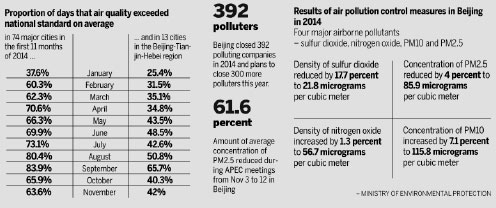Strict controls help clear the air
 0 Comment(s)
0 Comment(s) Print
Print E-mail China Daily, January 12, 2015
E-mail China Daily, January 12, 2015
 |
The capital is also considering making the odd-even license plate traffic restriction, which was implemented during the Asia-Pacific Economic Cooperation meetings, a permanent restriction.
During the event, from Nov 3 to 12, air quality was mostly maintained at healthy levels in Beijing.
The average concentration of PM2.5 during the period was reduced by 61.6 percent because of measures that included the suspension of work at construction sites and polluting companies in the Beijing-Hebei-Tianjin region.
"The measures to rein in vehicle exhaust made up 39.5 percent of the reduction of PM2.5 emissions and proved that our controls were effective," said Fang Li, deputy director of the Beijing Municipal Environmental Protection Bureau.
Regional cooperation among Beijing and surrounding areas was a major reason the green objectives were met, he said.
Measures to control air pollution should be part of the improved mode of economic development, and the government should upgrade the economy with environmental protection in mind, said Minister of Environmental Protection Zhou Shengxian.
China lowered its annual GDP growth forecast to 7.5 percent at the beginning of 2014, and priority was given to upgrading the economy in line with high-quality growth and clear goals to reduce pollution.
Last year, many cities adopted plans to restructure and control the growth of polluting companies.
Beijing closed 392 polluting companies in 2014 and plans to close 300 more polluters this year. The government also plans to promote advanced technologies for companies to cap emissions and upgrade their products and services.
Hebei, where heavy industries are a major contributor to economic growth, has required core yet polluting industries such as the iron, steel and cement sectors to slow down by closing some plants and setting emissions caps.
With such deep cuts to industrial production, the central government has allocated funds-as much as 10 billion yuan ($1.6 billion) last year to encourage more initiatives from local governments to optimize their economy for "green GDP".
However, experts have expressed concern over the country's capability to meet its target for improving air pollution.
The current measures might not help the Beijing-Hebei-Tianjin region lower their concentration of PM2.5 as planned, according to a report released in September by Tsinghua University and the Clean Air Alliance of China.
"More stringent measures should be implemented, and the joint efforts in the region can be strengthened to promote the reduction of emissions," said He Kebin, a professor of environmental science at Tsinghua University.






Go to Forum >>0 Comment(s)